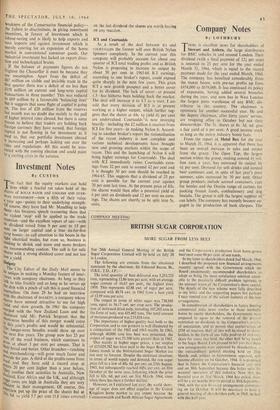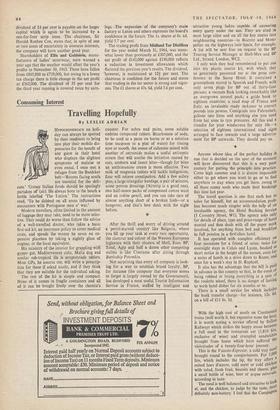Company Notes
By LOTHBURY THERE is excellent news for shareholders of I Stewart and Ardern, the- large distributors for BMC vehicles in and around London. Their dividend (with a final payment of 121 per cent) is restored to 25 per cent for the year ended March 31, 1964, which is equal to the record payment made for the year ended March, 1960. The company has benefited considerably from the motor boom, with pre-tax profits up from £454,000 to £659,000. It has continued its policy of expansion, having added several branches during the year, and now has in West London the largest parts warehouse of any BMC dis- tributor in the country. The chairman is optimistic for another successful year. He and the deputy chairman, after forty years' service, are resigning office in October but not their directorships. The 2s. shares at 8s. 3d. xd. give a fair yield of 6 per cent. A good income stock as long as the motor industry boom lasts.
From the report of Metal Box for the year to March 31, 1964, it is apparent that there has been an overall increase in sales and output from the group. The Open Top, the largest section within the group, making around 41, mil- lion cans a year, has increased its output by Of per cent. Demand for soft drinks and canned beer continues and, in spite of last year's poor summer, sales increased by 30 per cent. Other group products include aerosol containers, caps for bottles and the Diotite range of cartons for packing frozen foods, confectionery and dog biscuits. The group is still the largest supplier of can labels. The company has recently become enL'''' gaged in the production of bank cheques. The
dividend of 14 per cent is payable on the larger capital which is again to be increased by a one-for-four scrip issue. The chairman, Sir Harold Roxbee Cox, states that, in spite of one or two areas of uncertainty in overseas interests, the company will have another good year.
Shareholders of Ellis and Goldstein, manu- facturers of ladies' outerwear, were warned a year ago that the weather would affect the year's profits to November 30, 1963. These have fallen from £805,000 to £758,000, but owing to a lower tax charge there is little change in the net profit at £362,000. The dividend of 35 per cent for the third year running is covered twice by earn- ings. The expansion of the company's main factory at Luton and others expresses the board's confidence in the future. The Is. shares at 6s. xd. yield 5.7 per cent.
The trading profit from Midland Tar Distillers for the year ended March 31, 1964, was some- what lower than previously at £307,000, and the net profit of £143,000 against £190,000 reflects a reduction in investment allowances which flattered the previous year's results. The dividend, however, is maintained at 12-} per cent. The chairman is confident for the future and states that trading in the tar sector is strong and vigor- ous. The £1 shares at 43s. 6d. yield 5.6 per cent.











































 Previous page
Previous page